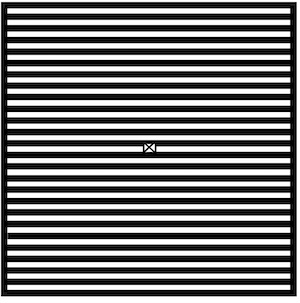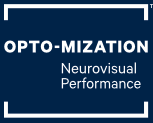Sea-sickness is a common time when this happens to people, as their visual and vestibular systems think different things are happening. This is often mis-diagnosed as vestibular migraines.
“I was diagnosed with disequilibrium and vestibular/ vision mismatch last fall. It was so debilitating that I was unable to work. I was almost constantly dizzy, nauseated, and anxious. I was unable to concentrate and had frequent headaches whenever I tried to read a book or work on the computer…Read More”- SUSAN
After Meniere’s or vestibular neuritis, vision can cause dizziness
Your visual and vestibular systems were once well integrated. Then along comes a problem with your vestibular system such as Meniere’s or a neuritis, which changes how the two systems work together.
Now the two systems don’t match up the way they used to, and you will be much more sensitive to any vision problems. By improving the accuracy of your vision and re-calibrating the two systems you can improve many of your symptoms and get back to being you.
Vision
Your vision is responsible for 70% of the sensory information coming in to your brain. This includes your understanding you are in space. If your vision does not calculate this properly, it can lead to dizziness, vertigo and more. Many times a clean bill of eye-health is given without investigating these areas.
It is common for people with these vision problems to have trouble with motion, head movement, tracking objects, grocery stores, patterns, lights and more. Many people who have chronic dizziness or vertigo and are still suffering have functional vision problems that have been overlooked.
Treatment involves re-calibrating how the eyes and brain work together (vision therapy). This may also include specialty lens prescribing (Ergoptics) that works to improve this function.
Vestibular
Problems with the vestibular system can cause dizziness, vertigo and balance problems. BPPV (benign paroxysmal positional vertigo) is a leading cause, and happens when the crystals in the inner ear fall out of place. Treatment time is often within about 2 weeks and involves repositioning maneuvers.
Vestibular rehabilitation focuses on how the brain is using and integrating the signals from the vestibular system. If your vision is not functioning well, you may plateau in your vestibular rehabilitation.
Cervicogenic
Your brain uses information from proprioceptors in your neck to help it understand where your head is relative to your body. Injury such as whiplash can cause damage to these areas. This means that your brain will be receiving mixed signals about where your body is, leading to dizziness and often headaches.
Treatment often involves working with a chiropractor or physiotherapist who has extra training in these areas.
HEADACHES OR MIGRAINES? THINK VISION
Your vision may be causing your headaches or migraines

Hover over the image to take the test.
See if your vision is causing you headaches, migraines, dizziness or more.
Step1: Hover over the picture to display the image.
Step 2: If it causes you any negative symptoms or discomfort, it indicates that your brain is not processing vision accurately. Contact us for an appointment.
Treating Headaches and Migraines
If the pattern glare test caused you any symptoms or discomfort, your vision is almost certainly part of what is causing you symptoms. All that pattern did was give you visual stimulus, which your system was unable to process well, resulting in discomfort or symptoms. The pattern brings it on quickly, but the same thing is happening to you all day long on a lesser level. This is not just a ‘blue light’ problem.
Treatment may involve addressing glasses prescriptions and/or vision therapy/training to improve how your brain is using your vision. This leads to a reduction in headaches, migraines and other associated symptoms.

Seniors are often affected by depth perception and balance
Tricia was a senior who was had to take the stairs one at a time, always holding the railing. She had to be careful in dim light, and often mis-judged where curbs or steps were. She was falling more and more. Once she had her depth perception working properly, she was able to go down stairs without a railing, walk over ground with much more confidence, and hasn’t fallen in a long time.
Many seniors are struggling with navigating stairs, uneven ground and are at risk of falling. These problems are often a result of poor depth perception and problems with their vision. Too often they are told that this is just related to ‘getting old’ and are left struggling.
If you or someone you love is having trouble with falling, balance, or stairs, please ensure that they have their vision tested beyond just seeing clearly and the physical eye health. This can help keep them healthy and independent.
Clumsiness is often caused by poor depth perception
Sarah was a fantastic rower, but couldn’t catch a ball to save her life. Imagine the surprise of her teammates when all of a sudden she was able to catch keys that were thrown at her?
There are many people who are considered clumsy that have problems with depth perception. This makes sense. If they can’t accurately judge where an object is, how are they supposed to catch it, avoid knocking it over, or avoid running into it? Often family members are surprised when they try on the goggles that cause them to experience similar depth perception problems. All of a sudden a lot of behavior makes sense.
Know someone who won’t drive through spaces that you know they will fit, or waits way too long to turn left? There is a good chance that they have difficulty judging the distances or the speed of the oncoming car. This type of depth perception is about more than just seeing the little animals popping out of a booklet.

Your Focal and Peripheral Systems
A helpful way to think about it is as though you possess two different visual systems for incoming information. Approximately 20% of the incoming visual information is not used for your central focus, but instead goes to areas of the brain responsible for peripheral balance and motor planning. So, while many patients may pass all tests in terms of their focal (central) system, issues with their peripheral system can still result in symptoms and difficulties. This can be a frustrating experience for many patients as they are repeatedly told their vision is ‘fine’ even though they’re experiencing headaches, dizziness, fogginess and balance problems.
The focal system
is responsible for the “20/20” vision, and the small central area of your vision. Approximately 20% of the incoming visual pathways are not used for your central vision, but instead go to areas of the brain responsible for balance and motor planning. Very often in brain injury or Post Trauma Vision Syndrome (PTVS) there is a mismatch between how the information is used from these two systems.
The peripheral system
is responsible for the information used in motor planning, balance, determining where to focus and how to compare the information from the two eyes. While many patients may pass all tests in terms of the focal system, the mismatch between the focal and peripheral system can leave them with many symptoms and difficulties. This is a frustrating experience for many patients as they are repeatedly told their vision is ‘fine’.
Neuro Visual Performance
At the Opto-mization NeuroVisual Performance Centre, we assess how your eyes and brain work together and develop a program to improve the efficiency of your neurovisual pathway. This can include Opto-mization Training™ and Ergoptics™ lens prescription to enhance eye tracking, visual processing and focusing abilities that support reading, comprehension and focus.
